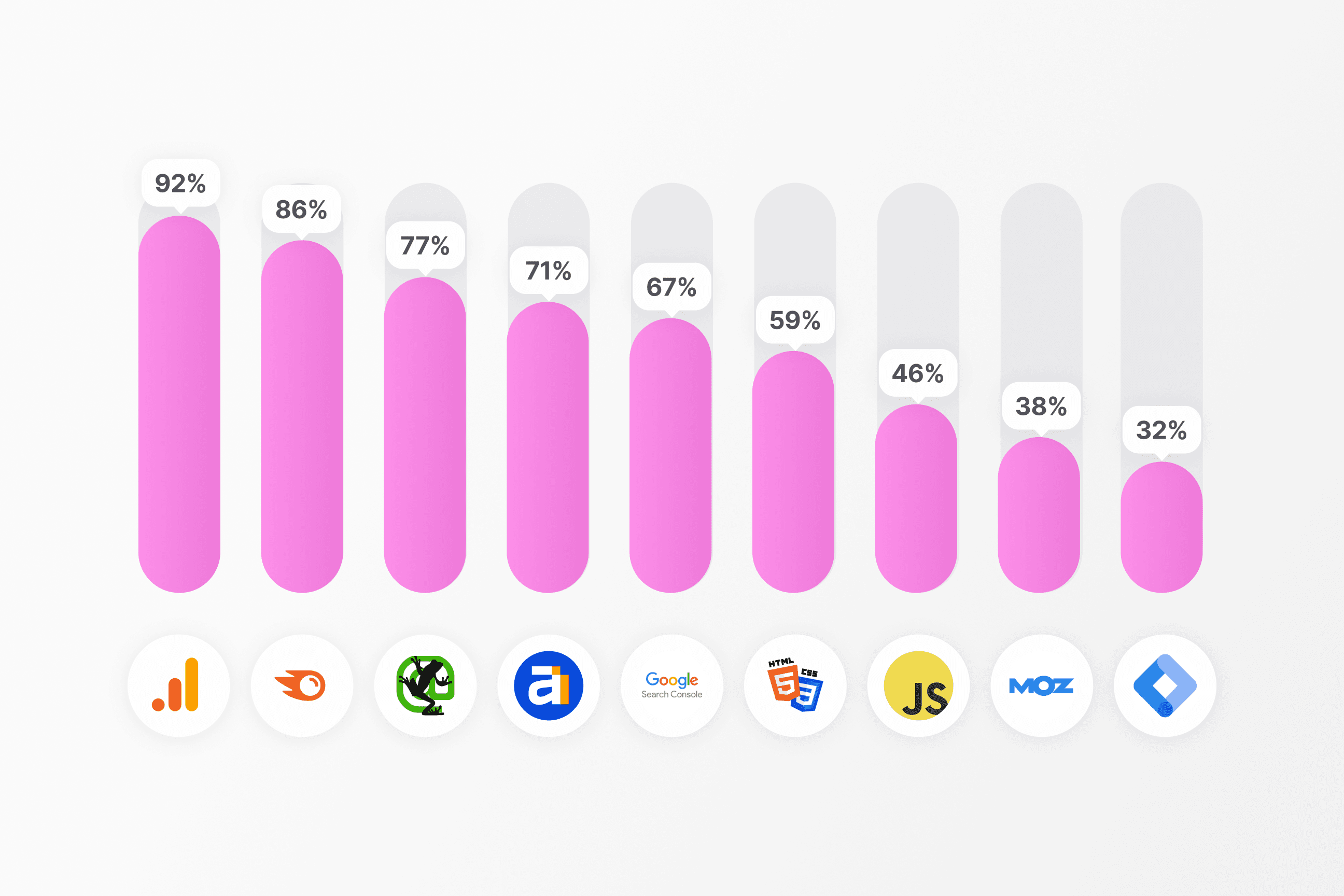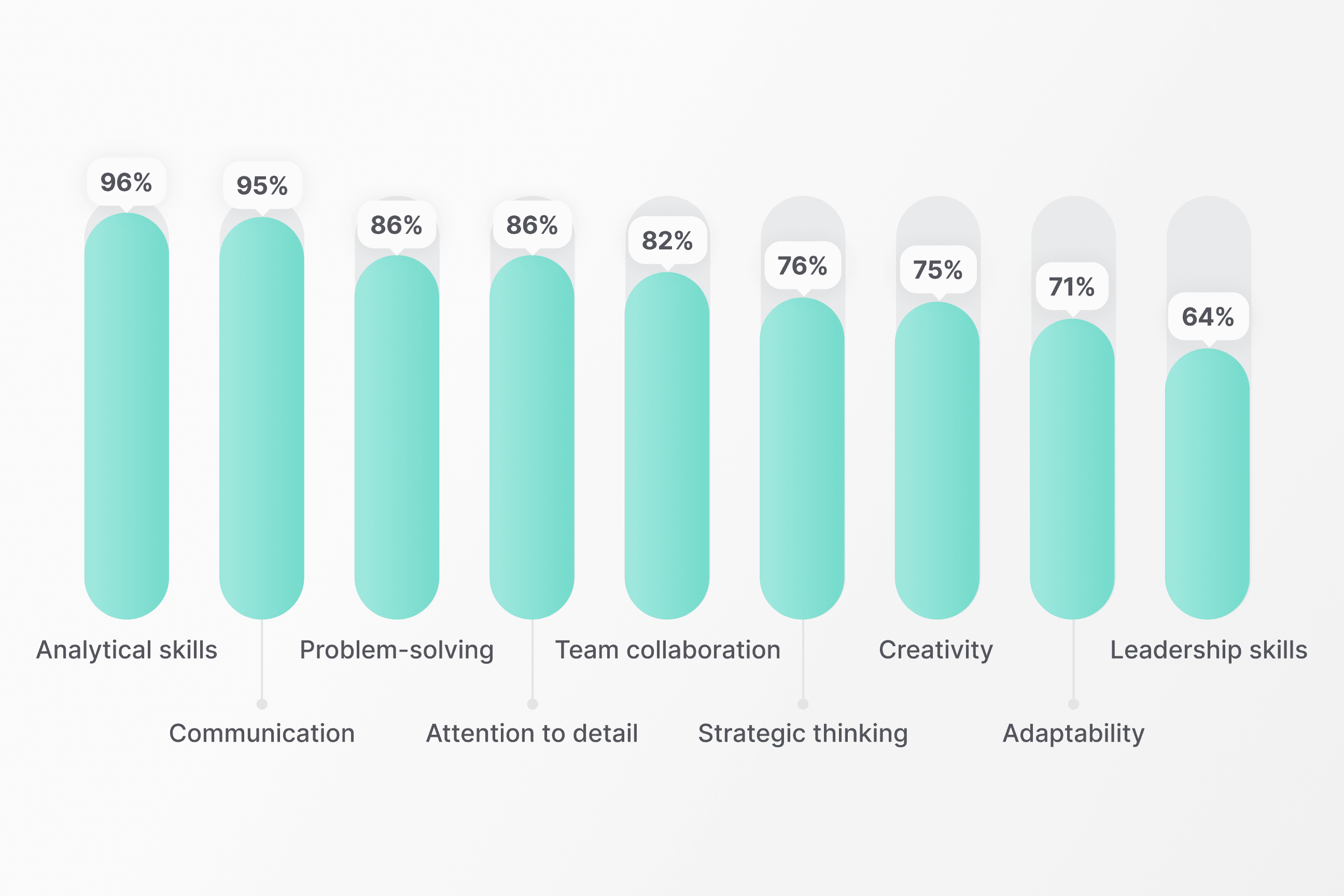Top 18 SEO Skills That Get You Hired in 2025

Natalia Toth
The tech industry and digital agencies saw major layoffs in 2024.
Yet, the demand for SEO expertise is booming. Forbes predicts a 22% increase in open SEO roles by 2030.
To land your dream SEO position in 2025, you need to showcase a standout skillset. We analyzed 90 SEO job descriptions and talked to hiring managers to identify what hard and soft skills employers value most in candidates.
Bonus: we'll provide tips on how and where you can develop these skills.
9 must-have hard skills for SEOs in 2025
Hard skills are the technical foundation of your SEO toolkit. They're easy to assess during interviews and easy to verify in your portfolio.
The SEO landscape is constantly evolving, just like the platforms and technologies we use (think Google Analytics updates!). Staying current with these changes is crucial.
But it's not just about mastering the basics. Proactive SEOs actively explore new tools that can streamline workflows. For example, tools like Ranking Raccoon can take the legwork out of link-building outreach.
Now, let's see what hard skills that employers prioritize in candidates in 2024.

1. Google Analytics (GA)
By far the most sought-after hard skill in SEO specialists, Google Analytics was mentioned in 92% of job descriptions.
Employers seek candidates who can analyze website traffic and user behavior. That said, GA4 has a steeper learning curve than the earlier version, Universal Analytics.
Where to learn it: Google Skillshop is a good starting point to get a grip on the new features and interface, but consider supplementing your learning with industry blogs and webinars to stay ahead of the curve.
2. Semrush
As mentioned in 86% of descriptions, Semrush seems to be the leading SEO platform in the eyes of employers.
Candidates should be able to leverage Semrush to conduct keyword research and competitor analysis, as well as optimize content.
Where to learn it: Explore Semrush Academy for free in-depth tutorials and earn a certification you can add to your CV.
3. Screaming Frog
77% of employers look for SEOs who can work with Screaming Frog. It is an essential tool for conducting website audits and identifying technical SEO issues. Candidates should be able to utilize Screaming Frog to improve site performance.
Experiment with Screaming Frog's free version to get comfortable with the tool, and consider investing in the paid version for advanced features as you progress in your SEO journey.
4. Ahrefs
Ahrefs does not fall much behind Screaming Frog. Candidates should be adept at using Ahrefs to inform link-building strategies and perform site analysis and competitor research.
Where to learn it: Ahrefs offers a robust knowledge base, and free Academy courses. These help you learn the tool and refresh SEO knowledge.
5. Google Search Console (GSC)
Two-thirds of employers consider expertise in Google Search Console (GSC) a must-have. It's a powerful toolset, alongside Google Analytics, that empowers you to track website performance in search results, identify keywords you rank for, and diagnose and fix technical SEO issues.
Employers value SEOs who can leverage GSC's data to optimize website visibility.
Don't just settle for surface-level insights. Familiarize yourself with GSC's advanced features like URL Inspection Tool to pinpoint crawl errors and Mobile Usability Report to identify and address mobile-friendliness problems.
For a comprehensive dive into GSC, explore this guide by Hubspot, or consult with GSC documentation.
6. HTML/CSS
A strong foundation in HTML and CSS is essential for on-page SEO. These languages allow you to directly implement SEO elements and optimize website structure for better search engine crawling and indexing.
Where to learn it: W3Schools, Codecademy, Coursera, and Udemy all offer comprehensive (and often free) tutorials on HTML/CSS and JavaScript with exercises.
You can also explore free YouTube courses on JavaScript (for example, check out this one by freeCodeCamp).
7. JavaScript (JS)
While not explicitly required in every job description, proficiency in JavaScript (JS) is increasingly desired for advanced SEO tasks. With JS knowledge, you can optimize website functionalities that directly impact search engine ranking.
8. Moz
The platform equips you with a comprehensive toolkit for in-depth SEO audit, keyword research, competitor analysis, and tracking keyword rankings.
Where to learn it: Moz Academy's courses.
9. Google Tag Manager (GTM)
Mastering GTM allows you to efficiently manage website tracking codes. Employers value SEOs who can set up and configure tags to accurately track user interactions. GTM's user-friendly interface makes it approachable, but there's always space to streamline your workflow.
Where to learn it: For a strong foundation, take a beginner GTM course by Google Academy.
Alternatively, consider this high-rated Udemy course to become a tag management pro.
Will certifications help me stand out?
Practical experience is what employers prefer any time over formal education.
However, mentioning certifications on your CV can improve your chances if:
- You are applying for junior SEO positions: certifications demonstrate foundational SEO knowledge, making you a strong candidate for entry-level roles.
- You had a long career break: certifications showcase your commitment to staying updated with the ever-changing SEO industry.
- A job requires proficiency in a specific tool you haven't used yet: a relevant certification shows your dedication to learning it.
- The job description emphasizes the ability to learn continuously and be proactive
Here are the top eight SEO certifications mentioned by employers (from most to least mentioned):
- Google Analytics Certification
- Google Ads Certification
- SEMrush Certification
- Google Tag Manager Certification
- HubSpot Inbound Certification
- Moz Certification
- Facebook Blueprint Certification
- Hootsuite Social Marketing Certification
What about Content Management Systems (CMS)?
Hands-on experience with a CMS is crucial for most SEO roles. A whopping 76% of job postings mention it as a requirement.
WordPress is the undisputed king of CMS platforms in the SEO world, followed by Webflow. It appears in over a third of role descriptions. Being able to manage and optimize content in WordPress will give you a competitive edge.
While WordPress dominates, larger companies might use a different CMS tailored to their needs or niche. Don't be discouraged if you haven't previously worked with a platform: showcase your experience with a similar CMS in your CV. And during the interview, express your eagerness to learn and master the new platform.
Knowing English is enough to do SEO well. Or not?
It depends on the geography of your job search. Since we analyzed job openings in the English language, fluency in English was highlighted in 94% of them.
But knowing other languages is often listed as a bonus. In the end, as an SEO, you optimize content for a specific language, and understanding the nuances is crucial.
In Europe and the US, even if the main working language is English, you can stand out by knowing Spanish, German, and French. Prepare to outshine local applicants for whom it is a mother tongue.
Top 9 soft skills to develop in 2024
Soft skills are often cited as even more important than hard skills - because they are transferable across roles and industries.
While hard skills make you a qualified candidate for a specific role, soft skills make you able to learn, adapt, and collaborate effectively in any work environment.
Now, let’s see what 9 soft skills employers look for in an ideal candidate in 2024.
1. Data deciphering and algorithm analysis
With almost every job description mentioning it, being good at analytics is the most important skill for an SEO manager.
As an SEO professional, you're exposed to tons of data from a myriad of tools every day - take just Search Console, Google Analytics, Ahrefs, Semrush, and others for example. Employers seek candidates who can make sense of large data sets, focus on what's important, and then make informed data-driven decisions to set up and optimize SEO strategies.
To hone your analytical skills, consider taking online courses on data visualization or storytelling (for example, one by Datacamp or one on Udemy). Learning how to present complex data insights clearly and compellingly will impress potential employers.
“I normally use test assignments to see if a candidate has an analytical mindset. For example, I share with them a link to a website and ask how they would make it better. They don't even have to suggest SEO-specific ideas: it can be anything that would improve the performance of the business. This way, I see how hard it is for the person to go out of their comfort zone and how easily they can generate creative insights.”
Marketing Team Lead at Aloa / Digital Operations Manager at SMT Digital
2. Storytelling skills
Being a good communicator is just equally important. Employers want to hire SEOs who can articulate their ideas clearly, both verbally and in written format.
During the interview or the test assignment, demonstrate that you can effectively convey SEO strategies and insights, make complex things understandable, and that you are not afraid of reporting performance to stakeholders at any level.
“The ideal candidate should communicate openly and be ready to admit it if they don’t know something.
When I give test assignments, that's a red flag for me if the candidate doesn't come back to me to clarify what they don’t understand.
And on the other hand, I'll be happy to hire a person who is not scared to show that they lack knowledge but have the courage to confront a challenge anyway.”
Oussama Bettaieb
Marketing Team Lead at Aloa / Digital Operations Manager at SMT Digital
3. Troubleshooting and conundrum cracking
The job of an SEO manager is like solving an endless puzzle: for each website, you need to come up with a unique solution to go from A to B. No wonder that 87% of employers seek candidates with outstanding problem-solving skills.
So during the selection process, demonstrate what challenges you solved in the past for a specific project, what approach you took, and what the results were. Using the STAR model is the way to go.
In addition to showcasing past wins, you can also impress companies by highlighting your problem-solving framework. Do you brainstorm potential solutions with your team? Do you leverage online communities or forums to get fresh perspectives? Demonstrating a structured approach to problem-solving will make you a strong candidate.
Bonus tip: build a portfolio with past projects and attach the link to your cover letter, or send a message to the hiring manager.
“When hiring for a senior SEO position, I want to see a proven track record of ranking websites. So a portfolio of previous projects is a must-have. A portfolio is more important than experience with a specific tool. Because, let’s say, if a person never used SEMrush before, it doesn't mean they don't know how to do SEO - they simply need to learn the new interface.”
Oussama Bettaieb
Marketing Team Lead at Aloa / Digital Operations Manager at SMT Digital

4. Laser focus on data that matters
Attention to detail is essential for ensuring accuracy in SEO campaigns and avoiding errors. Employers look for candidates who can meticulously review data and implementations.
While a keen eye is crucial, there are ways to amplify your attention to detail. Consider creating checklists that you’ll use across projects, so as not to miss out on anything.
5. Cross-functional team synergy and stakeholder management
Now, this is almost a universal soft skill for most professions. Collaboration is key in SEO roles, you’ll often work in cross-functional teams (with developers, content creators, or web designers) to achieve common goals. Candidates should be able to effectively communicate SEO strategies to non-technical audiences, actively listen to different perspectives, and find common ground to achieve optimal results.
Highlight your experience working on cross-functional teams and showcase successful collaborations. It will impress your potential employer.
“SEO is not a silo; it needs to involve valuable team members to work correctly and create a successful SEO campaign. An SEO Specialist must be able to communicate SEO concepts and strategies to team members, clients, web developers, content marketers, and other stakeholders.”
Founder at Pinnacle Pursuit SEO
6. Understanding how SEO aligns with big business goals
Being great at tactics is good - thinking long-term is what sets you apart. To stand out to potential employers, show them how you would tie long-term SEO plans with overall business objectives. In the end, SEO is the means, but ultimately, companies aim to attract relevant users, convert them into customers, generate revenue, and conquer a portion of the market.
Don't just focus on ranking keywords; demonstrate how your SEO strategy aligns with the company's broader business goals. Showcase how SEO can improve brand awareness, generate leads, or increase sales.
“Old SEO tactics no longer work; the field has become more complex. An SEO Specialist must look past outdated practices and understand the new way SEO works. A successful SEO strategy involves creating stunning content, optimizing for rich snippets, and improving website performance.
User-centric mindset is equally important. Taking into consideration factors like Conversion Rate Optimization (CRO) and User Experience (UX) will be more important than ever in SEO. As Google's SEO Starter Guide emphasizes, an SEO specialist should always prioritize helping users and providing them with the best possible experience.”
Dillon Loomis
Founder at Pinnacle Pursuit SEO
7. Out-of-the-box thinking to improve SEO performance
To compete for users' decreasing attention span, SEO experts, like marketers in general, have to think out-of-the-box. During a selection process, demonstrate how you've devised non-trivial strategies and content that stood out to readers and what results and feedback you got.
To keep your creativity supercharged, subscribe to pages that collect outstanding marketing campaigns (we love the Famous Campaigns page on LinkedIn), follow SEO thought leaders, and don't be afraid to experiment - but always support your decisions with data (back to analytical skills!)
Attend free SEO and marketing events to learn about the latest SEO trends and spark new creative ideas. Those are also excellent networking opportunities!
8. Algorithm adaptability
SEO is an appealing field to many precisely because it's constantly changing. Keeping up with all the changes in Google algorithms, AI trends, and tool updates can be daunting.
When you are at an interview, show the employer your eagerness to learn new techniques in SEO and how you keep a pulse on the search industry. Demonstrate your adaptability by showcasing your ability to learn new tools quickly and efficiently. You can also highlight instances where you've had to adjust your SEO strategy based on algorithm updates or competitor analysis.
“Adaptability must be the most important quality I look for in an SEO specialist in 2024. With the rise of AI and AI Overviews, an SEO Specialist must be able to quickly adapt their strategies to align with the algorithm updates as the industry shifts. The ability to stay on top of the latest SEO tips, tactics, and trends is more important than ever.”
Dillon Loomis
Founder at Pinnacle Pursuit SEO
“I always ask candidates for their opinion on what's happening in the industry, be it the latest Google algorithm update or the leaked documentation on racking metrics. By asking this, I want to see if the person is truly passionate about SEO and understands these changes' impact on their job.”
Oussama Bettaieb
Marketing Team Lead at Aloa / Digital Operations Manager at SMT Digital
“The most important quality of an SEO specialist is adaptability. Because the digital landscape constantly evolves, as the Core Algorithm Update by Google in March 2024 showed us.
This update disrupted SEO strategies, causing websites to experience ranking volatility. Only an SEO specialist with updated knowledge and skills can effectively navigate these changes.”
Senior Content Writer / Content Team Leader
9. Inspiring and leading others
Leadership skills were mostly mentioned in Sr. SEO Manager and SEO Lead positions. So if you’re applying for a position that implies team management, it's a no-brainer.
But leadership is not always about just managing others. It's also about being able to come up with an idea, take ownership, inspire other team members, and foster a positive work environment. Even in non-leadership roles, leadership skills can be valuable. Demonstrate leadership by taking initiative on projects, mentoring junior colleagues, or proposing innovative SEO strategies.
To sum it up
The SEO landscape is changing by the hour, and the job market is as tough as never before. But the demand for outstanding professionals - especially with this fierce fight for consumers’ attention! - is actually on the rise.
In this article, we unpacked 18 must-have SEO skills employers are looking for in 2024, along with tips on how to sharpen your toolkit.
Whether you're a seasoned SEO or just starting in the industry, this guide equips you to land your dream SEO job and thrive in this exciting field. We’re rooting for you!

Natalia Toth
Marketing Manager